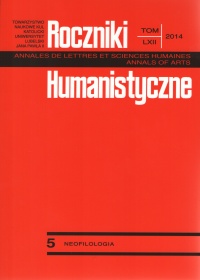Memory of the Holocaust as an Imperative: Places of Remembrance — Auschwitz and the Monument of the Heroes of the Warsaw Ghetto Uprising — in the Writings of Stephan Hermlin that Were Written after the Second World War
Abstract
In the literature of the GDR, where the problem of the II World War was a central topic, texts that were related to the annihilation of the European Jews were almost nonexistent. The reasons of this void were political matters: The political leaders of the GDR created so called “anti-fascist creator myth” of a new country and claimed themselves as “the heroes of the history”; additionally they declared aggressive anti-Israeli politics. The works of Stephan Hermlin, written in 1949, in the same year as the creation of the GDR, are a few of the examples that faced the Holocaust in the literature generated in the East Germany. The main starting points in the author’s writings were the places of the remembrance that he visited in 1949: Auschwitz and the Monument of the Heroes of the Warsaw Ghetto Uprising; in his writings the memory of the murdered victims becomes a value of a superior significance.
References
Arnold, H.L. (Hg.): Einigkeit und Ruinen. Eine deutsche Anthologie. Frankfurt am Main 1999.
Assmann, A.: Erinnerungsräume. Formen und Wandlungen des kulturellen Gedächtnisses. München 2003.
Bartoszewski, W.: 1859 dni Warszawy. [1859 Tage Warschaus]. Kraków 1982.
Benz, W.: Antisemitismus in Deutschland. In: P. von Bettelheim, S. Prohining, R. Streibel (Hgg.): Antisemitismus in Osteuropa. Aspekte einer historischen Kontinuität. Wien 1992, S. 25–40.
Buryła, S.: Tematy (nie)opisane. [(Un)beschriebene Themen]. Kraków 2013.
Diner, D.: (Hg.): Zivilisationsbruch: Denken nach Auschwitz. Frankfurt am Main 1988.
Edelman, M.: Ghetto walczy. Udział Bundu w obronie getta warszawskiego [Das Ghetto kämpft. Die Rolle des Bundes in der Verteidigung des Warschauer Ghettos]. Warszawa 1945.
Edelman, M.: I była miłość w getcie. [Die Liebe im Ghetto]. Warszawa 2009.
Emmerich, W.: Kein Holocaust? Die gekappte Darstellung des Zweiten Weltkriegs in der DDR-Literatur. In: J. Egyptien (Hg.): Erinnerung in Text und Bild. Zur Darstellbarkeit von Krieg und Holocaust im literarischen und filmischen Schaffen in Deutschland und Polen. Berlin 2012, S. 17–31.
Głowiński, M.: Czarne sezony. [Schwarze Saisons]. Warszawa 1999.
Janion, M.: Bohater, spisek, śmierć. Wykłady żydowskie. [Held, Verschwörung, Tod. Jüdische Vorträge]. Warszawa 2009.
Kunert, G:: Atempause. In: Ders.: Die letzten Indianer Europas. Kommentare zum Traum, der Leben heißt. München, Wien 1991, S. 241–250.
Lambers-Petry, D.: Makkabäer. URL: http://www.bibelwissenschaft.de/stichwort/25406 (26.11.13)
Münkler, H.: Antifaschistischer Widerstand, frühbürgerliche Revolution und Befreiungskriege. Gründungsmythen der DDR. In: Ders.: Die Deutschen und ihre Mythen. Reinbek bei Hamburg 2011, S. 421–453.
Mitscherlich, A. u. M.: Die Unfähigkeit zu trauern. Leipzig 1990.
Nora, P., Schwan, G., Traba, R.: Czy Europa istnieje? [Gibt es Europa?]. Abgedruckt in: Gazeta Wyborcza vom 11.08.2007.
Szpilman, W.: Śmierć miasta. Pamiętniki Władysława Szpilmana 1939-1945. [Der Tod einer Stadt. Władysław Szpilmans Tagebücher 1939-1945], hg. von J.Waldorff. Warszawa 1946.
Szpilman, W.: Pianista. Kraków 2000. Auf Deutsch: Das wunderbare Überleben - Warschauer Erinnerungen 1939-1945. Übersetzung von Karin Wolff. Vorwort von Andrzej Szpilman. Mit einem Essay von Wolf Biermann. Anhang von Wilm Hosenfeld. Düsseldorf, München 1998.
Copyright (c) 2014 Roczniki Humanistyczne

This work is licensed under a Creative Commons Attribution-NonCommercial-NoDerivatives 4.0 International License.





